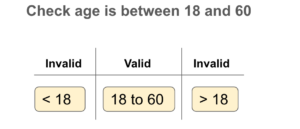Equivalence Partitioning is a software testing technique that divides the input data of a test into partitions of equivalent data from which test cases can be derived.
This comes under the Black-box testing technique.
Here the test data is divided into partitions and the test cases are designed to cover each partition at least once.

So it is a process where we divide all possible test values into partitions or classes and then take one or few values from each class to cover the test values.
Also called Equivalence Class Partitioning (ECP)

Advantages of Equivalence Partitioning
- Less number of tests
- Can cover all possible sets of tests data
- Less time in execution
- Minimizes sets of test data
Disadvantages of Equivalence Partitioning
- It does not consider the conditions for boundary value.
- The identification of equivalence classes relies heavily on the expertise of the testers
References
https://en.wikipedia.org/wiki/Equivalence_partitioning
https://www.maniuk.net/2016/08/qa-equivalence-partitioning.html
https://qa-platforms.com/equivalence-partitioning-testing/